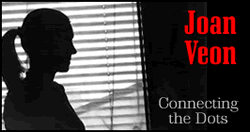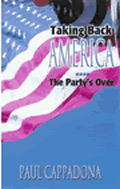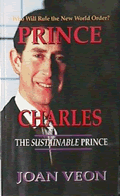Related
Articles:
Global Taxes Looming, Watch Your Wallet
Other
Veon
Articles:
US Leaders Highlight World Economic Forum Agenda
Global Taxation And Tax Harmonization
Does The
Global Economy Need a Global Currency?
THE NEW YORK STOCK EXCHANGE GOES GLOBAL
By
Joan Veon
March 8, 2006
NewsWithViews.com
On Wednesday the New York Stock Exchange world�s biggest stock exchange founded 213 years ago will go public. Its goal is to build a war chest in order to buy up other stock exchanges around the world. These actions herald a new phase in the new world order.
With stock exchanges around the world going public, it is the New York Stock Exchange that is the last of the private non-profit companies to offer shares to the public. You can imagine that if all the exchanges in the world are listed companies, then the mergers and acquisitions that are common among other stocks will also be part of the stock exchange empire. Can you imagine the NYX, as the new public company will be called, buying the Euronext and/or the London Stock Exchange? Talk about power! This is a parallel to the central banking power that now runs the global banking system.
Furthermore, within the last eleven years, the coming of a global stock exchange will compliment an evolving global currency and global tax. For those who say world government is far off, you had better point them in this direction. In order to understand what Wednesday really means, let us review structures that have been put in place that compliment a global stock exchange.
When Andrew Jackson was elected President in 1828 he announced in his first message that he would not renew the charter of America�s first central bank. He ended up vetoing the law Congress passed to re-charter the Bank. Jackson pointed out that the bank�s stock, valued at $8 million, was held by foreigners--chiefly in Britain. His concern was that a majority of shares of its stock might fall into alien hands, which if we were involved in a war, could use its influence against the United States.
In 1913, the question of a central bank came up again. The people involved in this effort included some of the wealthiest people in America: Senator Nelson Aldrich (grandfather of David Rockefeller); Jacob Schiff and Paul Warburg of Kuhn, Loeb and Company, an international banking house; Piatt Andrew, Assistant Secretary of the Treasury; Henry P. Davidson, Senior Partner of J.P. Morgan & Company; Charles D. Norton, and Frank Vanderlip, President of National City Bank which today is CitiGroup. The passage of the Federal Reserve Act of 1913 was done through chicanery. Those in the Senate who favored the Act did not go home while those that were against it went home for Christmas. In a special session convened with quorum, the Act passed at 11:45 p.m. on December 24, 1913.
With the passage of the Federal Reserve Act, our monetary system changed back to one of control by a private corporation and not the U.S. Treasury. Our currency now says, �Federal Reserve Note.� Earlier in the day on December 24, 1913, Congressman Charles A. Lindberg, Jr. stated from the House floor: �This Act established the most gigantic trust on earth. When the President signs this bill, the invisible government by the Monetary Power will be legalized�The worst legislative crime of the ages is perpetrated by this banking bill.� We should note that President Woodrow Wilson could have vetoed this bill like Andrew Jackson did, but he was put in power by the same powers that passed the bill.
Since 1913, the Federal Reserve has evolved into a very powerful entity globally. The Federal Reserve Act has been amended over 195 times with greater empowerments in the last ten years that have included more types of discount window loans. The discount window is where banks borrow from the Fed overnight to maintain their stated level of capitalization. The Fed now accepts for collateral: Treasury and federal agency securities, gold certificates, Special Drawing Rights, foreign currencies, and discount window loans made under Section 13 of the Federal Reserve Act. What this means is that as the indebtedness of America grows, the Fed is willing to take more types of collateral to secure their loans to the government!
As a result of the Asian Crisis in 1997-1998, the Group of Seven finance ministers, under the direction of President Bill Clinton and then Treasury Secretary Robert Rubin invited the central bank ministers of the G7 countries to join them in their discussions. Since 1998, it is both the G7 treasury secretaries and the central bank ministers who are directing the global economy.
The role of central banking in the United States was seen after the crash of the stock market in 1929. The Crash came about as a result of (1) America reducing the gold content of the dollar by 40%, (2) Speculation in the stock market, much of which was financed by credit, (3) Foreign investors selling their stocks, and (4) the Federal Reserve taking money out of the banking system which the Fed thought would stop the frenzy. In other words, this private corporation used the same technique used to burst the Nasdaq bubble seventy-two years later�they took money out of the banking system which made the market drop.
The Fed or any central bank is able to create market highs or lows by the amount of money they pump into the banking system (they buy U.S. Treasuries, which puts money into the system) or by taking money out of the banking system by selling U.S. Treasuries. When the Federal Reserve took money out of the banking system, it caused the Depression. John Maynard Keynes, a British socialist and economist, came over to advise President Franklin Roosevelt. His solution was to go into debt in order to stimulate the economy. President Roosevelt financed all of his New Deal programs by borrowing money.
The legacy today of Roosevelt and Keynesian economics is that every level of government is broke: local, county, state, and federal and every level of government is selling assets in order to pay down debt. In the last several years, the City of Chicago sold the Chicago Skyway, a toll road to Spain�s Grupo Ferrovial and to a unit of Australia�s Macquarie Bank for $1.8B. Since then other toll roads around the country are being sold. The ports are part of the same equation.
When President Franklin D. Roosevelt was elected on his �New Deal for the American People� program, his first act as president on his inaugural, March 4, 1933, was to declare a national bank holiday. For the next 8 days, banks were closed because of the number of people withdrawing their savings in gold.
A little more than a month later, on April 20, Roosevelt passed the Emergency Banking Act of 1933 which took America off the gold standard. It put an end to the following: (1) Convertibility of notes into gold for Americans but allowed foreign countries to convert their gold-backed dollars at any time and (2) Private ownership of gold was made illegal except if you were a rare gold coin collector. In essence the American financial system was transferred from a standard of accountability which used gold to guard against excess debt, to a system in which there is no accountability. All a government has to do is print money. This opened the door for the massive debt which is Keynesian economics at its finest: a world in debt to a private group of bankers.
However, if you really want to control the monetary system of the world, not only do you have to control the banking system, but you have to devalue its money. It was President Nixon who severed any remaining ties the dollar had to the gold standard in 1971. Between 1933 and 1971, foreign countries that owned gold backed dollars were able to redeem them for gold. However, when Nixon closed the �Gold Window�, it changed the monetary system of the world from one in which currency was gold-backed to a paper system. Basically what Nixon did was to DEFAULT on millions of dollars that those countries held in their vaults.
There is no other historic incident that can equate the financial devastation that Nixon did when he took the dollar off the gold standard. Never before in the 6,000 year history of trade, was a piece of paper been used. During Biblical times and earlier, traders used animals, jewels, expensive clothing, and gold and silver to trade. These all have TANGIBLE value. Today, the world is on a fiat monetary system that has nothing of value supporting it. The purchasing power can drop simply by government printing more paper money! From what we can understand, this was the first phase of changing the monetary system of the world.
The second phase was to internationalize it. In 1944, finance ministers from over 40 countries of the world met in New Hampshire to set up financial international institutions that would deal with a post-War world: the International Monetary Fund and World Bank. Their objective was to set in place global institutions that would facilitate the financial and economic integration of the nation-states. That however was not the immediate objective. Both of these institutions were set in place to facilitate loans to help rebuild war-torn Europe. Today on a bi-annual basis, finance ministers from 186 countries of the world meet to determine the state of the world�s finances. Both of these organizations have been instrumental in �harmonizing� financial growth around the world and redistributing growth from strong countries to weaker countries. In fact, the World Bank established the International Finance Corporation that has established over 60 stock exchanges in third world countries.
From an economic standpoint, if you are going to put a global economic infrastructure in place, it must also be political and encompass trade. The United Nations was established in 1945 and the final piece of a global trading system was birthed in 1994 when our Congress passed the 27,000 page General Agreement on Trade and Tariffs which established the World Trade Organization. The purpose of which is to have a completely flat trading system�no barriers of any kind. No longer does the American farmer, accountant, manufacturer, or engineer compete with his competition across town, but he now competes on a global playing field. Since President Bush II has been in office, 2.7 million jobs have left the U.S.
Open borders supported by the World Trade Organization need for the countries of the world to de-regulate laws that restrict where people can invest. In 1980, during the Carter presidency, Congress passed the Monetary De-Regulation Act of 1980. It impacted the U.S. in several ways: First, it changed various federal laws as foreigners could now invest in America and Americans could now invest outside the United States. These changes led to the proliferation of foreign and global mutual funds, global mergers and acquisitions between companies, and $2T in stateless money running around the world daily looking for higher returns and a quick currency play. Obviously the integration of investments and corporations is part of making the world one and in changing its currency from individual nation-state currencies to a global currency. Secondly, it gave the Federal Reserve more power over the U.S. banking system.
At the 1995 Group of Seven meeting in Halifax, the heads of state and the G7 finance ministers embarked on putting in place a �new international financial architecture.� It included a number of deep empowerments and structural changes being made to the International Monetary Fund and the World Bank in order to prepare it for a world without borders. The IMF has the responsibilities which include �surveillance� of the world�s banking systems and the flow of monies worldwide. In addition, the IMF makes available lines of credit for countries in trouble, our Congress graciously made $18B available for this purpose. These changes were touted by both Robert Rubin and his successor Larry Summers as necessary for the 21st century. This is all part and parcel of the evolving global stock exchange.
Of course, no take-over of the global economic infrastructure would be possible without changing key laws. In 1999, Congress passed HR10 which was the �Banking Modernization Act.� It helped modernize our banking system by repealing the 1933 Glass-Steagall Act which separated commercial banking from investment banking. HR10 merged these two activities, thus returning the stock market to pre-1929 times. In addition it provided for foreign banks, insurance companies, and brokerage firms to buy American banks, insurance companies, and brokerage firms.
So now if you are going to globalize the entire financial architecture, you then need international accounting standards. Using Enron as an exampled, former Federal Reserve Chairman Paul Volcker called for international accounting standards. The fact that he is chairman of the Board of the Trustees for the International Accounting Standards Committee (IASC) which is located in London was very convenient! Now countries around the world are converting to these new rules.
Getting �Joe Average� into the market was also necessary. By the end of the 1990s, the highest number of Americans, 45%, owned stocks either through a 401k, IRA, or personally. Today, the market has a psychological affect on people. When it is up, people feel good and when it is down, they are not happy. When Greenspan was Fed Chairman, the bottom line is that �When Greenspan speaks, the markets listen.�
Lastly, to facilitate a global financial architecture, you need �market-based democracy� � that is what Treasury Secretary John Snow called it in February, 2004. He basically told the world that every market is dependent on growth in another country and that we need to let market forces work.
Secretary Snow was signaling the new MARKET BASED GOVERNANCE SYSTEM in which the stock, bond, commodity, and currency markets now rule the world. This change has been coming for some time and began with President Reagan and the privatization or selling off of government assets that he encouraged. Those assets, in some cases, went into the market. The World Bank also developed the market by setting up stock exchanges in many developing countries where there were none: China, Russia, Brazil, South Africa, Ghana, Poland, etc. To help these countries have stock to trade on their new exchange, they sold or privatized state owned assets: railroads, banks, telephones in order to list them on their new exchange. According to the World Bank, more than 80 countries are selling state-owned assets.
At one point in our banking history, banks held the loans they made as part of their portfolio: mortgages, automobile loans, credit card loans, and personal loans. Today, banks have sold them and transferred the risk that they use to assume to the market (you and me). This technique is called �securitization.� What this means is that the market now is like the kitchen sink�everything is in it: mortgages, auto loans, credit card loans, home equity loans, stocks, bonds---everything and now stock exchanges!
In 2002, based on remarks by Dr. Jacob Frenkel, I asked him if he saw a global currency in the market for a globalized world. He told me that before we could have a global currency, we needed harmonization of economies. Eighteen months later I asked former Federal Reserve Chairman Paul Volcker if we needed a global currency and he told me, �For the long term�but it�s a long ways off, if we are going to be successful in a globalized world, we should have an international currency.� Since 2004, I have been asking key officials at the Bank for International Settlements in Basle about a global currency, they have told me it is a long way off. I don�t know what they call �a long way off� for chief economist William White just issued a Working Paper, #193, in which he says the global imbalances that the world economy currently has will lead either to a return to the gold system (which is highly unlikely since you can�t print paper like we are currently doing) or an international currency.
So now we have the harmonization of world economies, the calls for an international currency, a market based system in which all assets are now traded on the stock or bond exchange and we are seeing now the rise of a global stock exchange! All we need now is global taxation and that too, is in the works.
|
Subscribe to the NewsWithViews Daily News Alerts! |
The
United States is the only country in the world NOT to have a Value
Added Tax and this is now part of President Bushes �tax simplification�
measures. As well, France is the first country to put a tax on airline
tickets to help the poor countries of the world. There are ten other
countries that are considering it as well. I asked French President
Jacques Chirac what he thought about a tax on airline tickets and
he told me that if it was success, �many more global taxes of this
kind� were being planned. Welcome to the new world order. World government
is not coming. It is here.
� 2006 Joan Veon - All Rights Reserved
Sign Up For Free E-Mail Alerts
E-Mails
are used strictly for NWVs alerts, not for sale
 Order
Joan Veon's book;
Order
Joan Veon's book;
"The
United Nations'
Global Straitjacket"
Joan Veon is a businesswoman and international reporter, having covered 64 Global meetings around the world in the last ten years. Please visit her website: www.womensgroup.org. To get a copy of her WTO report, send $10.00 to The Women's International Media Group, Inc. P. O. Box 77, Middletown, MD 21769. For an information packet, please call 301-371-0541
E-Mail: jveon@adelphia.net
Since 1913, the Federal Reserve has evolved into a very powerful entity globally. The Federal Reserve Act has been amended over 195 times with greater empowerments in the last ten years that have included more types of discount window loans.











